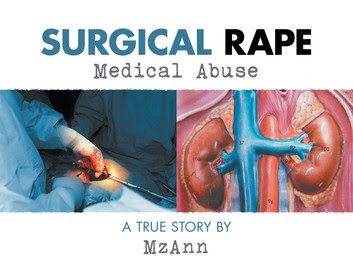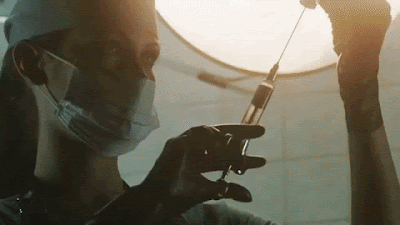This was going to be tacked on to my last post about my hatred and dread of doctors, but it began to spill out of me dreadfully today and I couldn't make it stop. I just hope I don't lose followers, as I did last time I expressed anything really painful. Only celebrities can "admit" to traumatic experiences like this and get a readership spike. The rest of us, apparently, get the opposite.
On Monday night I got a call, out of the blue, during supper, that I had to have a "consultation with a surgeon" (?) on WEDNESDAY, and to do my "cleanout" tomorrow. Cleanout? Oh yes, for the colonoscopy. (But nobody told me I had to -) Which was on Wednesday, the day after tomorrow - two days, what, what? - followed by "the surgery". I was completely unable to take any of this in, because it was said by a receptionist who talked very very fast and was obviously at the end of her shift. When I began to ask desperate questions, the putdown vocal tone and "calm down now!" attitude immediately kicked in. Only when I asked her for clarification did she email me colonoscopy "prep" notes, but nothing more, except a time and place.
The prep is better not talked about, not something for family viewing anyway, but it left me in a lot of pain in a very vulnerable area. In the hospital I was "prepped" for the procedure by a mechanically cheery nurse whom I heard say the exact same things to patients on the other side of the hospital curtain. The "surgeon", whom I had never met in my life before and whom I could not see because they had taken my glasses away, rattled on about "if I can do the procedure" (If?. . . Procedure?), then I was pushed into the next room. I was hooked up to an IV, so I assumed it would be like the last time I had one of these: I'd lie on my side, they'd turn on the juice, and it would be "bye-bye- land" until it was done.
Except.
There was none.
No. None. NO ANAESTHETIC for the colonoscopy - I was awake and conscious for the entire 45-minute thing, which was like being assaulted by a roto-rooter. At one point I began screaming - the pain was approaching the level of childbirth as the probe with the camera on the end punched and twisted and jabbed at the turns and folds inside my colon, and the nurse kept on telling me to keep quiet because I was disturbing the other patients. I asked why I was awake, and I was told, in a slightly indulgent, sighing tone, "Dr. So-and-so doubled the dose of pain medication," no doubt a ploy to get me to subside because I was making too much of a fuss. In other words, if you've had all that pain medication, you can't have any pain, so what are you complaining about? But I was awake, and in extreme pain, and no one would explain anything to me as to WHY this needed to happen. Nor was there any sense of apology for hurting me. Getting someone to listen was impossible.
After the "procedure", everyone rapidly exited the room and left me completely alone. No one asked me how I was doing (horrible) or if it still hurt (which it did, a lot, though today it is MUCH worse and at least a 7 or 8 out of 10). Nobody said anything at all because there was no one there. They just left, with no explanation of anything they had done, or why. Then my husband took me home. I was too dazed even to cry, although I don't remember feeling this deeply violated in many, many years.
When my husband recently had his prostate surgery, he was treated like a king. His urologist spent 45 minutes with him carefully explaining what they were going to be doing (and he had several weeks of lead time to prepare himself emotionally). He was given a FIFTY-PAGE document to read outlining the procedure, including every conceivable outcome from best to worst, so he wouldn't have to face any surprises. The feeling was that "men feel awfully vulnerable about things like this, it's their manhood after all, so they need lots of reassurance," which he got - in spades, from the family as well as the medical support team.
After the surgery, he spent the night in a quiet, beautiful room that even had a restful view. I remember him telling me the food was great. When he got home the next day, the entire family pitched in to help, and there were many solicitous emails flying back and forth - and they are STILL constantly asking him how he is, weeks later, though his recovery was textbook, he experienced no pain at all (he was given an epidural, which means he felt nothing below the waist), and is back to normal now. While I can't sit down because of the inflamed, toothachey sensation in my unmentionable parts, and keep getting waves of uncontrollable, deep shuddering that I know is the awakening of a very old trauma.
I am an older woman, I have had psychiatric and addiction problems in the past, and I was deeply violated, including sexually violated, in the hospital system over and over again, but whenever I express the view that the medical community treats me with dismissal or even contempt because of that bottom-of-the-barrel status, I am met with eye-rolls, sighs and shaking heads (followed by walking away). How on earth could I even THINK this would affect the professionalism of the medical community, which is always completely impartial and treats everyone with equal respect?
One doctor I had seen for fifteen years insisted that the medical community had nothing to do with my perception of mistreatment and that I "stigmatize myself". Doctors "would never" do anything so harmful to anyone, and "people like me" are never treated any differently, they're really quite tolerant of those kinds of things, so I had better "work on my attitude".
Apparently, nothing can or will be done about this, because in their minds, nothing happened. It's done, and I am in extreme pain. I can't talk about it either, it's too embarrassing and no one is interested, and even writing this now is a risk. I don't feel good about it, but I ask myself why I even write, if I must censor myself so carefully about things that affect me so profoundly.
I know that nerve damage, which is what this feels like, may well be permanent. Doing a colonoscopy without anaesthetic means the body is tense, the muscles are tight, and the pain made me involuntarily thrash, though I could vaguely see (without my glasses) two figures holding me down, one on either side, while she "did it". I could NOT "just hold still, it'll be over in a minute", said to me in exasperated "we've got another one" end-of-shift tones. The best image I could conjure up was of a bad dog at the vet.
I was only to find out later that there was also a surgical procedure done, surgery without anaesthetic, because it was easier for her to do this (and FASTER - I think the main thing was that she could get out of there quickly) while I was fully conscious. I kept thinking of the dentist's scene in The Boys from Brazil, and I keep wondering - some dark, hidden, wounded part of me keeps wondering - why? Well, why did ANY of it happen anyway, my past which apparently cemented me into a marginalized, silenced, powerless category from which there is no escape except death?
And why the sighing, the eye-rolling, the "we've got another one" attitude when I screamed out in pain? I don't remember pain like that, ever, except perhaps in childbirth, or being sexually assaulted over and over which also happened - but we don't write about that, do we, or express it, you must just keep it to yourself because it's "not nice", it's "nasty", I'm meant to deal with it like a mature person on my own, and besides, it "probably didn't happen anyway".
But this did.
This. Did.






































